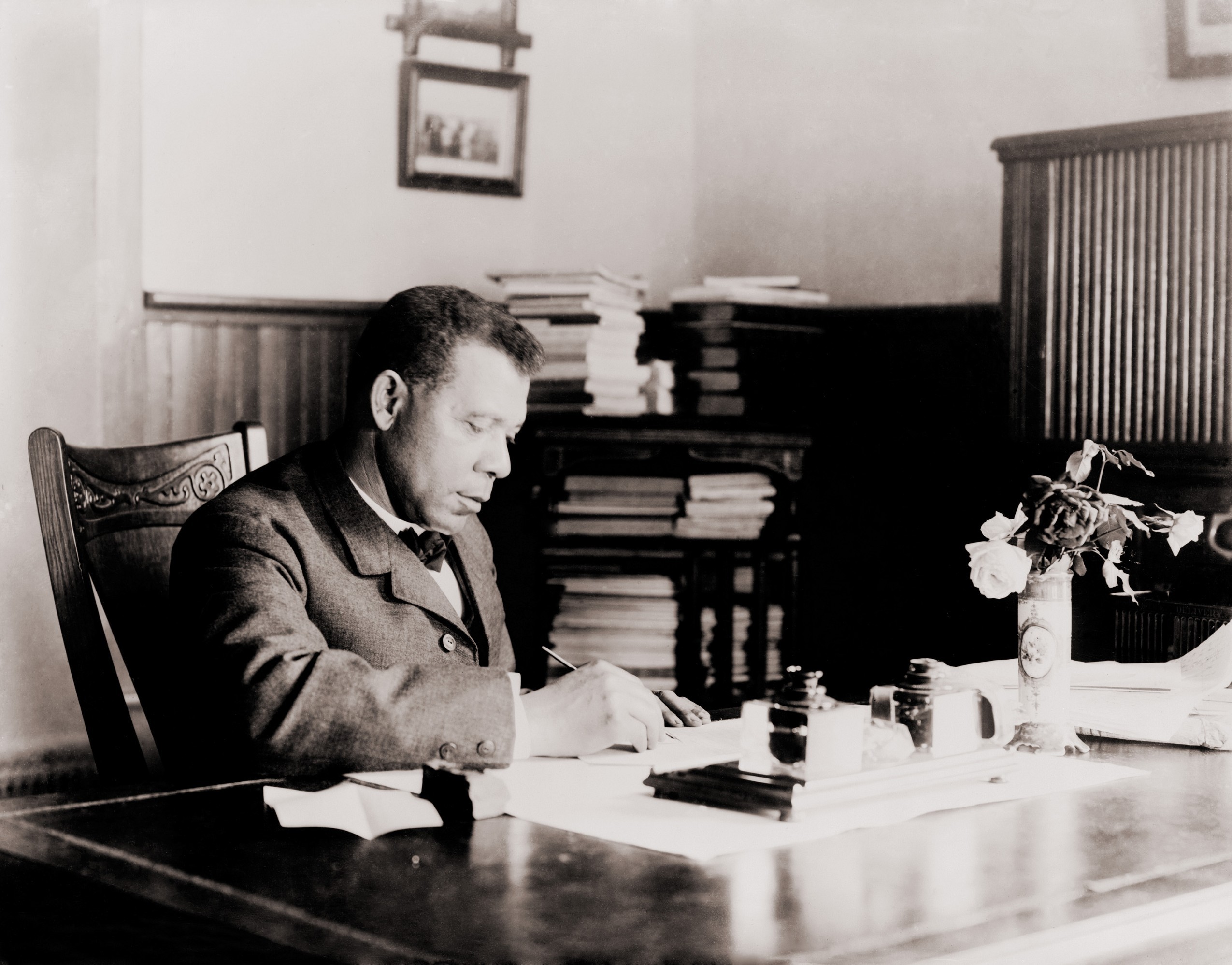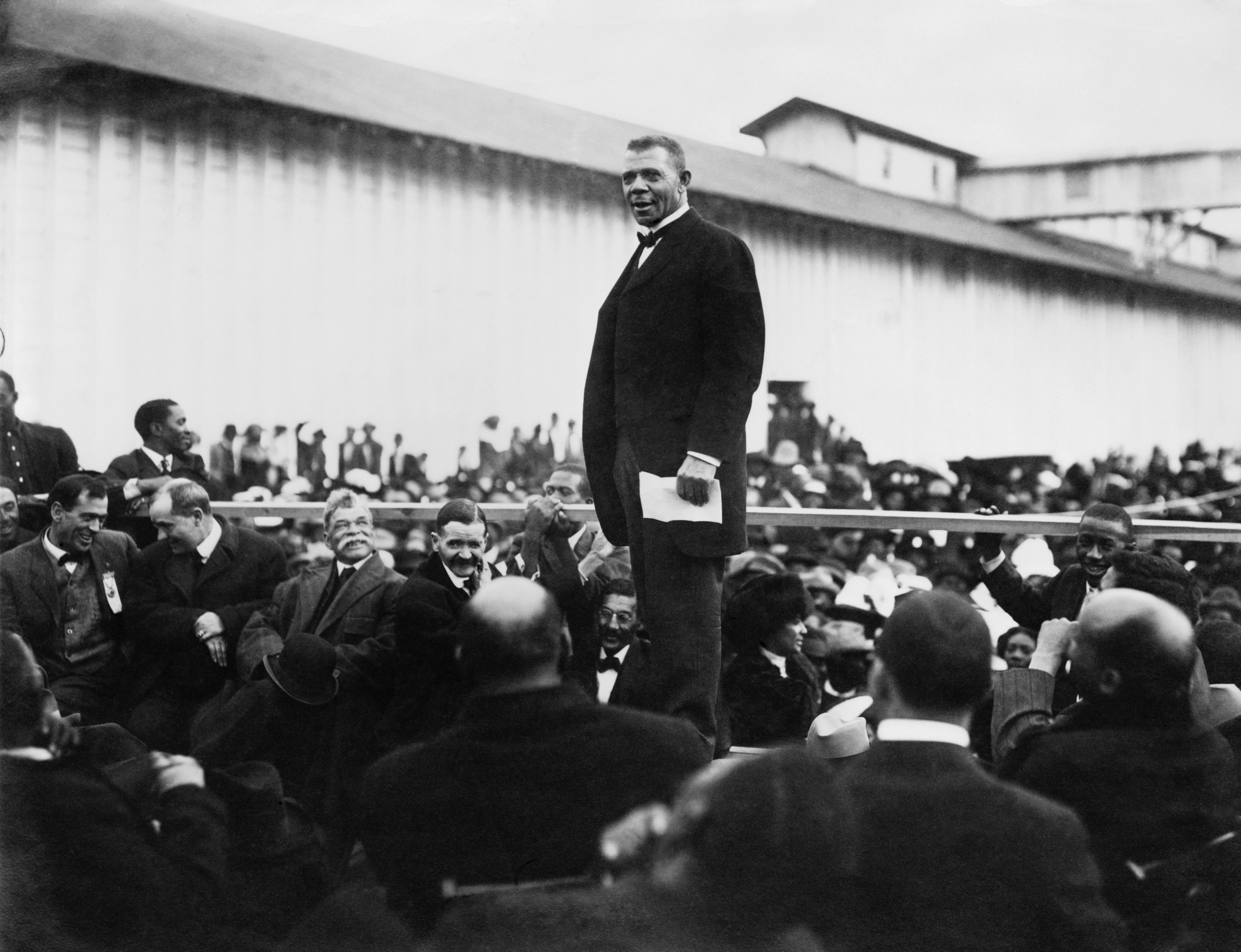Washington, Booker T. (1856-1915), was the most influential African American leader and educator of his time in the United States. He became prominent largely because of his role as founder and head of Tuskegee Institute, a vocational school for Black students in Tuskegee, Alabama.

Washington advised two presidents—Theodore Roosevelt and William Howard Taft—on racial problems and policies. He also influenced the appointment of several African Americans to federal office, especially during Roosevelt’s administration. Washington described his rise to national prominence as an educator in his best-selling autobiography, Up from Slavery (1901).
Early life.
Booker Taliaferro Washington was born in Hales Ford, Virginia, near Roanoke, on April 5, 1856. He was born into slavery. After the U.S. government freed all enslaved people in 1865, his family moved to Malden, West Virginia. There, Washington worked in coal mines and salt furnaces. From 1872 to 1875, he attended the Hampton Institute (now Hampton University), an industrial school for Black students in Hampton, Virginia. He became a teacher at the institute in 1879. Washington based many of his educational theories on his training at Hampton.
Educator.
In 1881, Washington founded and became principal of Tuskegee Normal and Industrial Institute. He started this school in an old abandoned church and a shanty. The school’s name was later changed to Tuskegee Institute (now Tuskegee University). The school taught specific trades, such as carpentry, farming, and mechanics, and trained teachers. As it expanded, Washington spent much of his time raising funds. Under Washington’s leadership, the institute became known as a model of industrial education. The Tuskegee Institute National Historic Site, established in 1974, includes Washington’s home, student-made college buildings, and the George Washington Carver Museum.
Washington believed that African Americans could benefit more from a practical, vocational education rather than a college education. Most Black Americans lived in poverty in the rural South, and Washington felt they should learn skills, work hard, and acquire property. He believed that the development of work skills would lead to economic prosperity. Washington predicted that African Americans would be granted civil and political rights after gaining a strong economic foundation. He explained his theories in Up from Slavery and in other publications.
Racial leader.
In the late 1800’s, more and more African Americans became victims of lynchings and of segregation imposed by Jim Crow laws (see Jim Crow ). To reduce racial conflicts, Washington advised African Americans to stop demanding equal rights and to simply get along with the white population. He urged white employers to give African Americans better jobs.

In a speech given in Atlanta, Georgia, in 1895, Washington declared: “In all things that are purely social we can be as separate as the fingers, yet one as the hand in all things essential to mutual progress.” This speech was often called the Atlanta Compromise, because Washington accepted inequality and segregation for Black people in exchange for economic advancement. The speech was widely quoted in newspapers and helped make him a prominent national figure and Black spokesman.
Washington became a shrewd political leader. He advised presidents, members of Congress, and governors on the appointment of African American and sympathetic white officials. He urged wealthy people to contribute to various Black organizations. He also owned or financially supported many Black newspapers. In 1900, Washington founded the National Negro Business League to help Black business firms.
Throughout his life, Washington tried to please white society in both the North and the South through his public actions and his speeches. He never publicly supported Black political causes that were unpopular with white Southerners. However, Washington secretly financed lawsuits opposing segregation and upholding the right of African Americans to vote and to serve on juries.
Opposition to Washington
came chiefly from W. E. B. Du Bois, a historian and sociologist. Du Bois criticized Washington’s educational and political philosophy and practices. Du Bois supported higher education for talented African Americans who could serve as leaders. He feared that the success of Washington’s industrial school would limit the development of true higher education for African Americans. Du Bois accepted the need for industrial training. However, he believed that African Americans should also have the opportunity to obtain a college education.
Du Bois attacked Washington’s compromising views on political and civil rights. Du Bois felt that people must openly strive for their rights. He criticized what he regarded as Washington’s surrender of rights and human dignity for economic gain. Du Bois also attacked some ways that Washington used his power. By controlling many Black newspapers, for example, Washington made it difficult for differing views to be published. Because he was acclaimed as the foremost Black leader, Washington helped determine what racial policies and practices were “acceptable.” Du Bois outlined his criticisms in his book The Souls of Black Folk (1903).
By 1910, Washington’s influence had started to decline as Du Bois and others began new movements. These movements led to the creation of such organizations as the National Association for the Advancement of Colored People (NAACP) and the National Urban League. Washington died on Nov. 14, 1915.
See also African Americans (The rise of new Black leaders) ; Du Bois, W. E. B. ; Niagara Movement ; Tuskegee University .
